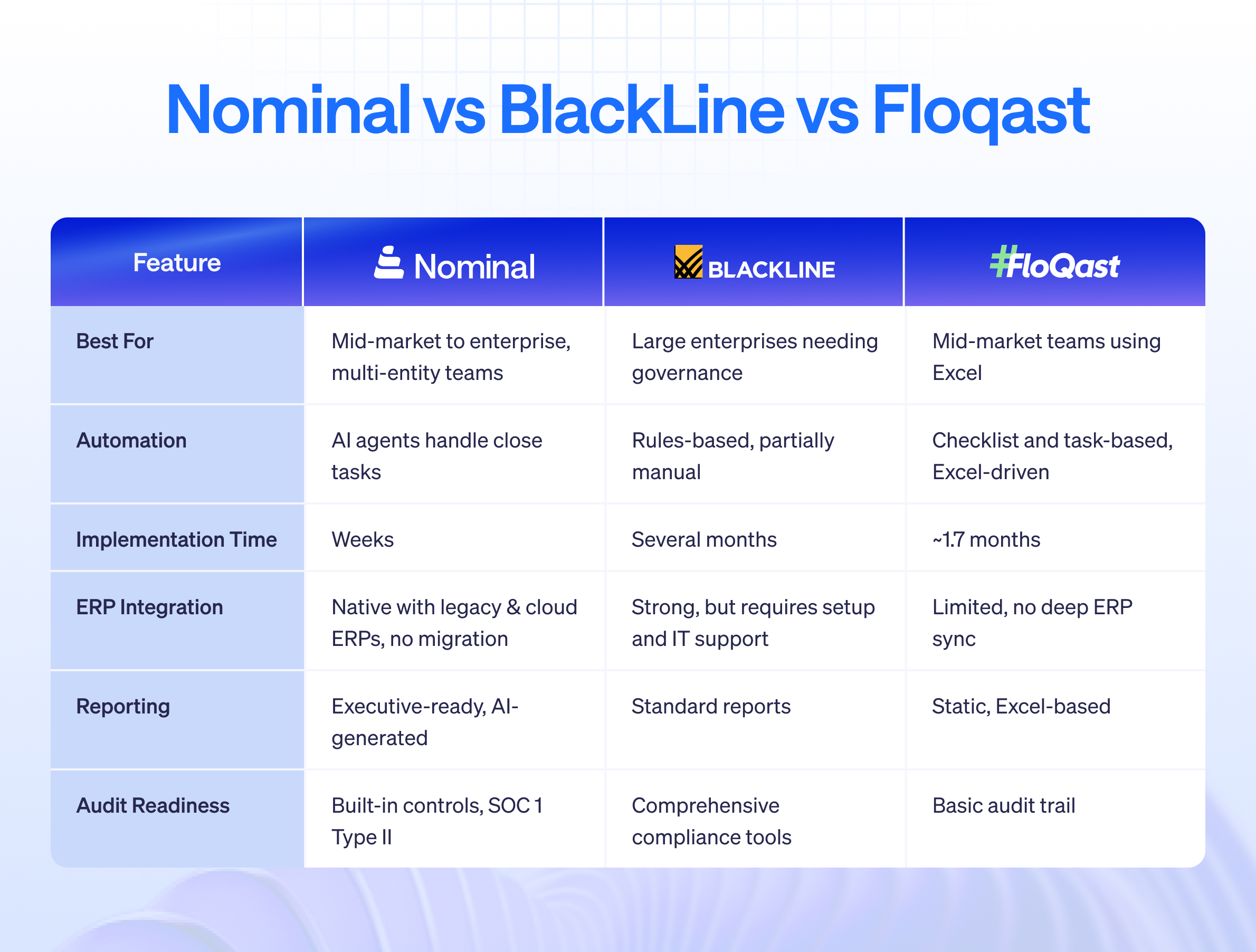
Comparing BlackLine vs FloQast? BlackLine suits large, enterprise teams while FloQast serves Excel-based workflows. But modern finance leaders are choosing a third path: Nominal. A software that adds AI-native agents, deep multi‑entity handling, and scalable automation without ERP migration.
Financial close software has evolved significantly over the past two decades. First came enterprise automation tools like BlackLine, helping large organizations digitize manual processes. Then came collaboration-focused platforms like FloQast, designed to support spreadsheet-heavy teams with lighter-touch checklists and task management.
Today, a new category is emerging. AI-native platforms like Nominal are redefining close automation with agentic AI, real-time ERP integrations, and built-in audit readiness. Rather than just organizing or documenting the close, they actively perform and accelerate it.
If you’re comparing BlackLine and FloQast, you’re likely evaluating the same core tradeoffs: scale versus simplicity, customization versus ease of use. But what if you didn’t have to choose?
In this guide, we’ll compare BlackLine vs FloQast and introduce a modern alternative: Nominal.
Why BlackLine Remains Enterprise Standard
BlackLine has long been considered the default choice for large enterprises, especially public companies with rigorous compliance needs. It was designed to replace manual controls with structured digital workflows, offering deep configurability and a strong focus on governance.
Its ability to integrate with major ERPs like SAP and Oracle, coupled with sophisticated rules engines, makes it well-suited for accounting teams with high transaction volumes and complex internal controls.
Key strengths:
- Up to 70% faster close for high-volume teams
- SOC-compliant controls and strong audit trails
- Global ERP integration and data normalization
- Fast Track implementation program for faster ROI
BlackLine's value shines in organizations with IT and implementation bandwidth, where tight control and standardization are mission-critical. For teams with the internal resources to manage it, the platform delivers proven scale and predictability.
You might also like: The 5 Best BlackLine Alternatives to Streamline Your Close in 2025
Why FloQast Appeals to Mid-Market Teams
FloQast emerged in response to a different pain point: spreadsheet dependency. It’s designed for teams that live in Excel and want a faster, more collaborative way to organize close activities without undergoing major system change. Its user interface is intuitive, and setup timelines are short.
Unlike BlackLine, which often requires IT involvement, FloQast plugs into existing folder structures and cloud drives. That means faster time to value, especially for lean accounting teams looking to add visibility and control without overhauling their workflows.
Key strengths:
- Typical implementation in 1.7 months
- ROI within 12 months (according to customer reviews)
- Native Excel integration and cloud collaboration
- Highly rated on G2 and TrustRadius for usability and support
FloQast works well for mid-market finance teams who need process management but aren’t ready for a full-blown financial automation suite. It’s a low-friction upgrade from spreadsheets, not a replacement for them.
Nominal vs BlackLine vs FloQast: Why Finance Teams Are Moving Forward
Finance leaders comparing BlackLine and FloQast are often choosing between complexity and convenience.
BlackLine supports large enterprises with heavy compliance requirements, but demands significant time and resources to implement. FloQast is easier to adopt but leans heavily on spreadsheets and manual tracking.
Nominal offers a third path: an AI-native platform that automates the close across fragmented systems without migration or overhead.
Unlike BlackLine, it doesn’t require rigid templates or IT lift. Unlike FloQast, it replaces spreadsheets entirely with intelligent workflows that scale.

Key differences at a glance:
- Implementation: Launches in weeks, compared to months for FloQast and quarters for BlackLine
- Automation: Uses AI agents to perform reconciliations, variance analysis, and reporting - unlike checklist- or rules-based approaches
- ERP Integration: Natively integrates with modern and legacy ERPs, avoiding migration headaches
- Reporting: Delivers executive-ready reports and explanations out of the box for faster decision-making
Whether you're seeking speed, intelligence, or a better way to handle multi-entity complexity, Nominal was built to elevate the close, not manage it manually.
What Makes Nominal Different?
Nominal was built to deliver the intelligence, flexibility, and control that modern finance teams expect but often cannot find in legacy or checklist-based platforms. From automation to integration and security, here’s how the platform stands apart.
Robust Integration
Nominal integrates with ERPs like NetSuite, QuickBooks, Oracle, SAP, and Xero without requiring migration. Smart data mapping connects your systems, so accounting teams can automate workflows instead of managing manual imports.
Secure by Design
Built by cybersecurity experts, the platform is one of the first AI-native platforms to achieve SOC 1 Type 2I certification. Every workflow is audit-traceable, and access is locked by intelligent, role-based controls.
Risk-Free Start
Nominal offers a 60 to 90-day proof of concept agreement, allowing teams to experience the full platform before committing. If it’s not the right fit, they walk away. No disruption. No risk.
Which Platform Should You Choose?
Each platform serves a different type of finance team based on scale, complexity, and system maturity. Whether you prioritize control, speed, or intelligence, aligning your choice with your operational needs is essential.
- Choose BlackLine if you need a rules-based, enterprise-grade system and have the IT resources to manage implementation.
- Choose FloQast if you're a mid-market team looking to organize your spreadsheet-based close process.
- Choose Nominal if you want intelligent automation, faster closes, full audit readiness, and the flexibility to scale across fragmented systems.
Nominal is the AI-native platform designed for finance leaders who want to close the books, not babysit them.
Choosing between BlackLine and FloQast ultimately depends on your team’s structure and goals.
BlackLine delivers standardization and governance for complex enterprises, while FloQast simplifies task tracking for spreadsheet-based teams.
But Nominal redefines the category: combining intelligent automation, seamless integration, and built-in audit readiness into one powerful platform.
Ready to explore the third option? Start with a 60-day proof of concept and see how Nominal handles reconciliations, reporting, and variance for you.





